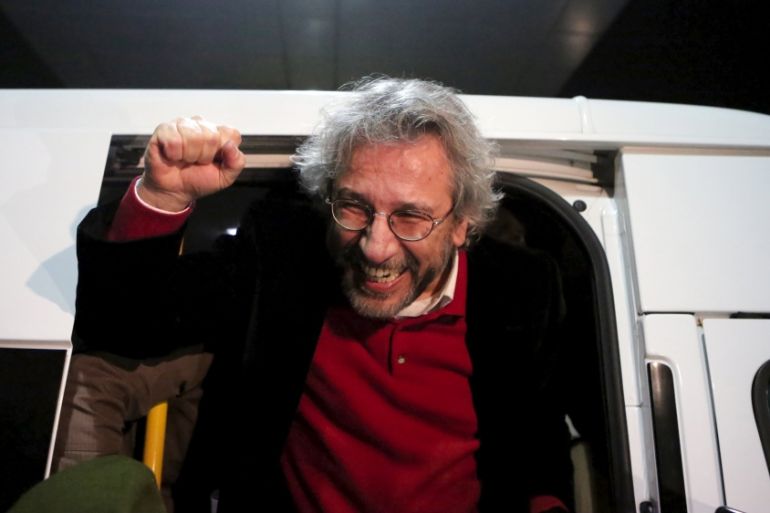Journalists accused of ‘terrorism’ released in Turkey
After 92 days of imprisonment, journalists who reported on alleged arms shipment to Syria freed after court ruling.

Two Turkish journalists from a prominent national newspaper have been freed from prison after the country’s top court ruled that their detention violated their rights.
Can Dundar, editor-in-chief of Cumhuriyet, and Erdem Gul, the daily’s Ankara bureau chief, were freed on Friday from Silivri prison, 92 days after they were detained over the publication of video footage purporting to show the state intelligence agency helping to send weapons to Syria.
Keep reading
list of 4 itemsGeorgia advances ‘foreign agents’ bill as 20,000 rally against it
Lawmakers brawl as Georgian Parliament considers ‘foreign agent’ bill
Journalist loses foot after being badly wounded in Israeli attack in Gaza
The arrest of Dundar and Gul last November drew international condemnation and revived concern about media freedom in Turkey under President Recep Tayyip Erdogan.
The court ruled on Thursday that detaining the two journalists had violated their rights. An advocacy group called for the charges against them, which carry a life sentence, to be dropped.
RELATED: UpFront – Noam Chomsky on ISIL, Turkey and Ukraine
Despite their release, the two still face possible life sentences at a trial on espionage and terrorism charges starting on March 25.
The journalists’ families and supporters gathered outside Silivri prison to greet them on Friday.
“We personally believed that this lawsuit was opened to intimidate people,” Dundar’s wife, Dilek, told Reuters news agency.
|
|
“Hopefully there are better days ahead of Turkey. I hope that journalists will be able to do their jobs better from now on.”
Dundar and Gul were charged with intentionally aiding an armed “terrorist” organisation and publishing material in violation of state security.
Cumhuriyet published photos, videos, and a report last May that it said showed intelligence officials transporting arms to Syria in trucks in 2014.
Erdogan, who has cast the newspaper’s coverage as part of an attempt to undermine Turkey’s global standing, said he would not forgive such reporting.
He has acknowledged that the trucks – which were stopped by police officers en route to the Syrian border – belonged to the MIT intelligence agency, and said they were carrying aid to Turkmens in Syria.
Turkmen fighters are battling both President Bashar al-Assad’s forces and the Islamic State of Iraq and the Levant (ISIL) group, which has seized territory in Iraq and Syria.
RELATED: Listening Post – Turkish media on tenterhooks
Yavuz Baydar, a Turkish columnist, says the court ruling is a good development but other journalists in prison in Turkey should not be forgotten.
“There are 25-30 journalists still in prison in Turkey,” he told Al Jazeera from Istanbul.
“When Can Dundar and Erdem Gul were leaving prison this morning, the remaining journalists told them: Do not forget us.”
Turkey languishes near the bottom of international press freedom tables. The European Union, which Turkey aspires to join, has said the country fails to meet the bloc’s human-rights criteria because of its harassment of journalists.
|
|
| What’s behind Turkey’s renewed crackdown on Kurds? |